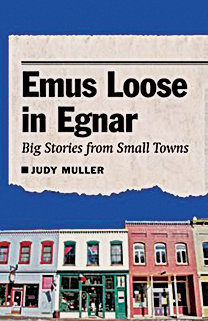 Pick up any weekly small-town newspaper and what will you find? More often than not an eternally sunny disposition, reflexive support for local endeavours, the occasional controversy and some rather relaxed editing standards. No surprise that a book celebrating small-town papers should display these same characteristics.
Pick up any weekly small-town newspaper and what will you find? More often than not an eternally sunny disposition, reflexive support for local endeavours, the occasional controversy and some rather relaxed editing standards. No surprise that a book celebrating small-town papers should display these same characteristics.
Emus Loose in Egnar is a pleasant, meandering trip through the weekly newspaper business in all its quirky splendour. With big-city papers under serious threat from the Internet and social media, Muller argues print journalism is “alive and kicking in small towns across America.” Her boosterism is infectious, if not always convincing. While Muller provides plenty of examples of feisty small-town editors keeping the print alive, those same editors are often delivering their own papers.
The most delightful moments of the book come from the ways local papers reveal small-town life in all its claustrophobic glory. From Nebraska’s Chadron Record police blotter: “Caller advised her neighbour has two Chihuahuas and he’s outside putting in an electric fence . . . that’s going to be too much for those little dogs.” And, “Caller advised that the batteries in her blood pressure machine are not working and is requesting an officer come over and change them for her.”
Where daily papers in bigger conurbations are inquisitive, skeptical and highly impersonal, their small-town versions are the exact opposite—every local sports team is a mighty competitor, names are often left out of embarrassing stories (then again, everyone knows who it was anyways), and obituaries are written by family members. One tip big-city papers might learn from their smaller cousins—most weeklies are loath to give away their stories over the Internet. “In small towns,” says one editor, “the future of print is print.”
True to her subject matter, Muller has a rather narrow focus on western U.S. towns and fixates on one Montana newspaper controversy for far too long. And she’s not immune to the occasional typo or awkward sentence. It’s all part of the appeal of small-town journalism.